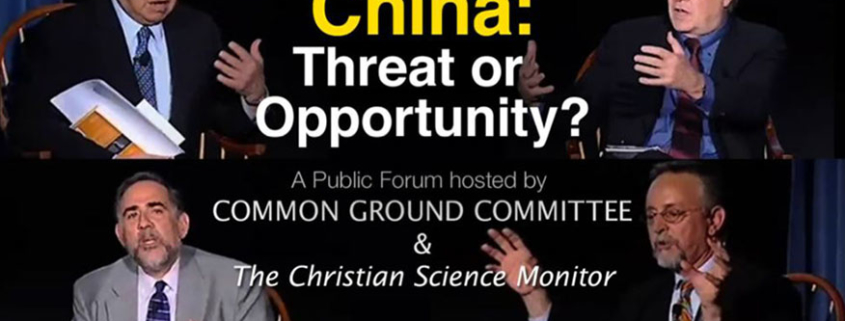
The U.S – China relationship is complex and of increasingly enormous importance as China’s economic and military power continues to grow.
Some experts believe we are headed toward deepening cooperation, stability, and peace while others argue the relationship will be marked by deterioration, global competition and ultimate conflict.
In 2011 The Common Ground Committee held its second public panel discussion entitled, “China: Threat or Opportunity.” The event was moderated by John Yemma, editor of the Christian Science Monitor, and brought together a panel of experts to discuss possible relationship scenarios between the United States and China and identify areas of agreement and consensus.
The foremost point agreed upon was the importance of actually getting to know the Chinese better and avoiding the stereotype-based public discussions aimed at creating anxiety and fear that many of us are so familiar with. The panelists saw the necessity for U.S. foreign policies to make a stronger effort in talking with Beijing on an eye-to-eye level with respect, understanding, and cooperation.
The discussion showed clearly that China’s growth is causing both fear and excitement, but that there is also agreement on a list of points in regards to future U.S. Chinese policies, China’s overall role in a global market, and importance of Chinese culture and society:
- Working rationally on the U.S.-Chinese relationship should be a top-priority
There was plenty of mutual agreement about the fact that the relationship between the two countries has not always been given enough consideration and that the U.S. should make it a priority to improve this relationship and create an atmosphere of understanding and dialogue. U.S. China policy should not be based on irrational behavior or be influenced by popular mainstream stereotypes about Chinese society and ambitions. Only a rational approach on an eye-to-eye level can create a lasting and mutually respectful relationship. - Getting to know the other culture is beneficial for both sides and the globe
In addition to the first point the panelists agreed that both countries will benefit from getting to know each other better. That includes understanding and appreciating specifically the other country’s culture and society as well as learning from different economic or business models. This point took the importance of mutual understanding to a global level by recognizing that the United States as well as China will play a significant political and economic role in decades to come and that an atmosphere of peaceful cooperation would help all parties. - “Free-Trade” has limits
The idea of free-trade, which is so prevalent in the United States, has to be viewed with caution and does not necessarily lead to wealth and prosperity by default but also opens opportunities for outsourcing of firms or corporations, thus hurting the countries. The panelists showed strong agreement that it is hard to find only one correct economic model; other models, such as the Chinese, have their own advantages as well. It is important for U.S. policy makers to understand other systems to better cope with them. - Mutual economic engagement is beneficial
It is clear that both countries, the United States and China, will benefit from a “fair” game economic relationship, but debate continued as to whether such a state can be reached within the near future. - Chinese Americans can help bridge gaps
There are many millions of Americans of Chinese heritage living in the United States today. These individuals, who very often feel American at heart, have a very unique and natural approach towards China. It was agreed that it is always useful to look at human resources at home, who can and will help to overcome misunderstandings and to refute stereotypes. - We must employ a highly informed and determined corps of diplomats
The U.S. government needs to ensure that the diplomats dealing with China are well educated in the field of Chinese culture and society, but are also able to “ruthlessly” show their Chinese counterparts the limits of cooperation and understanding if necessary.
PANELISTS
HENRY TANG
Investment advisor and former Chief Secretary for Administration of Hong Kong
DR. JOHN RUTLEDGE
Chairman of Rutledge Capital, visiting professor at Chinese Academy of Sciences and Chief Advisor for Finance and Investment to the Governor of Haidan District in Beijing
ALAN TONESLON
Research Fellow at the U.S. Business & Industrial Council Educational Foundation
PETER FORD
Christian Science Monitor correspondent, Beijing
Video
What is likely to be the future character of the relationship between the United States and the People’s Republic of China?
Read More
Event Summary – Common Ground Found
Transcript: China – Threat or Opportunity?





